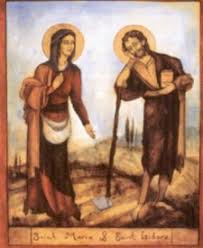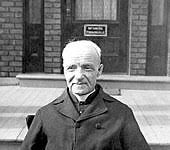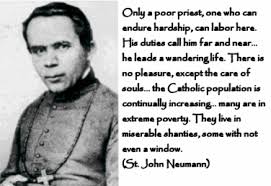Saint Isidore, or, in his native Spanish, Isidro de Merlo y Quintana, was named after the other Saint Isidore, the bishop of Seville (whom we celebrated back on April 4th). This saint, known to us as Isidore the Laborer (Labrador) – or the Farmer – was born about the year 1070 in Madrid, and spent his entire, outwardly uneventful life as a farm laborer for a wealthy landowner, on the outskirts of the city. He married a certain Maria Torribia, and their happy marriage produced a son, who in childhood was miraculously rescued from a deep well, after which they vowed continence to better devote themselves to the things of the Lord (someday, we may have a separate excursus on such so-called ‘Josephite marriages’ in another post).
Isidore and Maria were known for their piety and holiness, faithful attendance at daily Mass, feeding the poor, a consistent prayer life, all in the midst of their ordinary duties, signifying that we may find great sanctity simply in doing the duty of the moment. In fact, there is no other way to achieve holiness, but by doings God’s will, in the great and the small – and almost always the small – things in life. Plowing the field, feeding the animals, preparing breakfast, a smile for each other at the end of a long, hot and bothersome day, ‘little things done well’, for the love of God. For it is love – charity – and not the ‘greatness of the work’ that is the principle of merit before God (cf., Summa, I-II. q.114). We should always be ‘working’ in some way, which is not the same thing as ‘busy’. Ora et labora, wrote Saint Benedict centuries before Isidore, and his advice for monks also applies to lay folk. How much good could be done in the world by ensuring everyone had an acre or two of land, or at least a garden, to till with their family. We may throw in, as Chesterton advised, a cow and maybe some chickens and goats. The English writer did quite well without livestock, but the idea holds, for there are many metaphorical ‘gardens’ in life which we must tend.
It is very providential and fitting that Isidore’s feast falls on the anniversary Leo XIII’s encyclical Rerum Novarum, which the Pontiff promulgated on this day in 1891 (now much in the news after being mentioned by our new Pope Leo XIV). Therein, Leo XIII outlines the right to private property, based on its ultimate purpose, connected to human work, as developing and perfecting that piece of land one can call one’s own upon which one impresses one’s personality. Just so, one shapes and perfects it, so that it produces ‘good fruit’ that will provide for one’s needs, and ultimately lead to eternal life.
Pope Saint John Paul II develops this theme in his own 1981 Laborem Exercens, (see the reflection on May 1st, Joseph the Worker) where he distinguishes the objective value of human work – the ‘good’ that the work produces in the world – from the subjective value – that which the work does to perfect the worker. It is this latter that is most important, and fundamental, and which leads the worker, if he does well, to heaven.
So it was with Saint Isidore, whose life is filled with endearing miracles of multiplying food, of angels plowing his field while he was at Mass, and of his own body being found incorrupt when washed up in a torrential rain on April 2nd, 1212, nearly a century after his death on this day in 1130.
Isidore the Farmer was canonized on March 12, 1622 by Pope Gregory XV along with four other saints: Ignatius of Loyola, Francis Xavier, Theresa of Avila and Philip Neri. Three priests, one consecrated religious and, then, Isidore, a simple, married layman. (The members of the Oratory, which Saint Philip founded, like to joke that the Pope canonized ‘four Spaniards and a Saint’. But they all shared the common theme of holiness).
His body now lies alongside his wife – also up for canonization – in the church bearing his name in Madrid, secured with nine padlocks, for which only the King of Spain has the master key, and even he can only open it in the presence of the Archbishop (the last time was back in 1985).
The example of Isidore and Maria signifies that a simple, hidden married life – in the midst of the pots and pans, as Theresa of Avila would say – is a sure path to heaven, if lived with in harmony and laughter, prayer and good works, in all the good fruits of faith, hope and abiding charity.
Saint Isidore the Farmer, ora pro nobis! +










